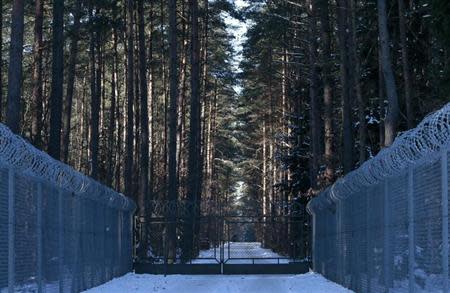|
By Christian Lowe
From Yahoo News | Original Article

Barbed wire fence surrounding a military area is pictured in the forest near Stare Kiejkuty village, close to Szczytno in northeastern Poland January 24, 2014. REUTERS/Kacper Pempel
WARSAW (Reuters) - Poland's official stance of denying it hosted a secret CIA jail is harming its reputation and it needs to be frank about what really happened, a senior intelligence official at the time the alleged prison was operating told Reuters.
A growing weight of information gathered by rights groups, lawyers and parliamentary inquiries suggests that Poland allowed its NATO ally the United States from around 2003 to detain al Qaeda suspects in a facility in a northern Polish forest.
Human rights campaigners say Poland was part of a network of states involved in the CIA's "extraordinary rendition" program after the September 11, 2001 attacks on U.S. cities by al Qaeda.
If any state officially acknowledges a role -- and activists say Poland is the most likely to do so -- that could lead to prosecutions of officials and to governments being forced to reveal details of sensitive dealings with U.S. intelligence.
Marek Siwiec, who headed Poland's National Security Bureau from 1997 to 2004, during the period when the CIA jail is alleged to have operated, said he wanted to see a "Commission of Public Trust" set up to expose what happened in Poland.
"The poor truth is better than a perfect lie," said Siwiec. "At this moment we have a number of poor lies and this creates a situation that I think should be changed."
"We have the position of common sense, the majority of people, who say: 'Of course there was something, whatever it was'," said Siwiec, who is now a European Parliament lawmaker.
Siwiec made clear he had not been informed of any decision to let the CIA run a jail in Poland at that time, when he was a security adviser to then-president Aleksander Kwasniewski.
But his call for a full investigation is the closest any senior Polish intelligence official, past or present, has come to acknowledging Poland has a case to answer on the matter.
"NEVER AGAIN"
Siwiec said a commission could unearth the truth, find out why it happened without apportioning blame to individuals, "and of course the conclusions should be: Never again".
Siwiec was one of several Polish officials, including Kwasniewski, named in a 2007 Council of Europe report as people who may be held accountable for knowing about or authorizing a CIA jail. They have all denied any such knowledge or role.
Under Polish and international laws on torture and illegal detention, anybody who knew about or authorized a CIA jail in Poland could be prosecuted - a factor that may discourage people who were involved from discussing candidly what happened.
Siwiec sued the author of the 2007 report, Swiss lawmaker Dicky Marty, for claiming he had known of a CIA jail. The case was dropped after Marty claimed parliamentary immunity, a Council of Europe spokesman said.
For nearly a decade, official Polish denials about a facility in the forest went largely unchallenged.
Rights campaigners say the issue is now nearing a watershed, with new accounts emerging from U.S. intelligence officers and with the European Court of Human Rights expected to rule this year in a case brought against Poland by two men who allege they were held at the facility.
According to a picture drawn from CIA leaks, accounts from inmates and flight records, starting around 2003 al Qaeda suspects were flown to a remote Polish airport and then taken to an intelligence facility near the village of Stare Kiejkuty.
There, according to the accounts, they were detained without court hearings or access to lawyers and were subjected to interrogation techniques, including waterboarding and mock executions, that rights campaigners say amounted to torture.
Washington has acknowledged it held al Qaeda suspects in jails outside U.S. jurisdiction but has not revealed where.
Last week the Washington Post newspaper, citing unnamed CIA sources, reported the agency paid Polish intelligence at least $15 million to use the Stare Kiejkuty facility.
Siwiec said that information was "credible" but that Poland should not leave to others to reveal what happened on its soil.
(Editing by Gareth Jones)
|